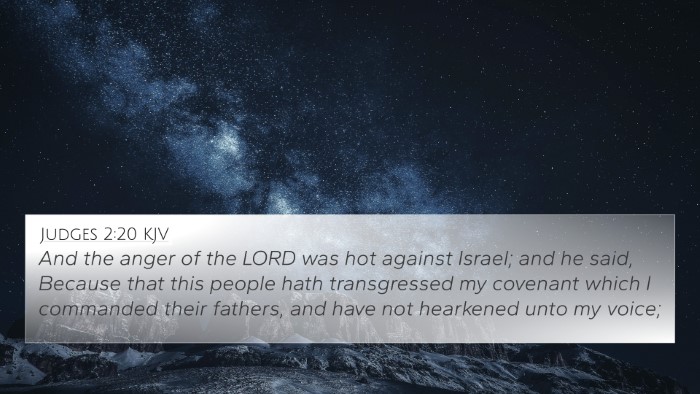Understanding Judges 3:8
Judges 3:8 states, "Therefore the anger of the Lord was hot against Israel, and he sold them into the hand of Chushanrishathaim king of Mesopotamia: and the children of Israel served Chushanrishathaim eight years." This verse marks a critical juncture in the cycle of disobedience, oppression, repentance, and deliverance seen throughout the Book of Judges.
Summary of Insights
The commentaries by Matthew Henry, Albert Barnes, and Adam Clarke collectively emphasize the following themes regarding this passage:
- God's Discipline: The anger of the Lord reflects His righteous displeasure with Israel's unfaithfulness and idolatry. The phrase "sold them into the hand" conveys the judicial action of God, allowing Israel's enemies to oppress them as a consequence of their sins.
- Chushanrishathaim: The identity of Chushanrishathaim, likely a title meaning "double wickedness," indicates the severity of Israel's punishment. His reign over Israel represents a time of darkness and oppression, compelling Israel to recognize their need for God’s mercy.
- Duration of Oppression: The eight years of servitude illustrates a significant period in which Israel suffered under foreign rule. This timeframe serves as a sobering reminder that disobedience to God often leads to extended hardships.
- Cycle of Judges: This verse introduces the cyclical pattern that characterizes the Book of Judges—Israel's rebellion, followed by God's anger, oppression by enemies, crying out for help, and God raising a judge for deliverance.
- Call to Repentance: It underscores the theme that hardships can lead to spiritual awakening; thus, Israel’s suffering serves as a catalyst for their return to God.
Bible Cross-References
Several other scriptures illuminate the themes presented in Judges 3:8. Here are some significant cross-references:
- Deuteronomy 28:15-68: Details the curses for disobedience, setting a foundation for understanding the consequences of forsaking God.
- Judges 2:14-15: Discusses the consequences of Israel’s unfaithfulness and sets the stage for the God’s disciplinary actions.
- 1 Samuel 12:9: Reflects on how Israel forgot the Lord and suffered under oppression, reinforcing the continuous theme of divine discipline.
- Micah 6:13: Speaks of punishment due to sin, similar to God's actions seen in Judges.
- Psalm 106:41-43: Describes the cycle of oppression and crying out to God, echoing Israel’s plight in Judges.
- Hebrews 12:6: Highlights God’s discipline as a sign of love, linking New Testament themes back to Old Testament experiences.
- Romans 1:24: Illustrates the principle of being "given over" to sinful desires as a form of God's judgment.
- James 4:7: Advises submission to God, opposing themes of rebellion against divine authority.
- Galatians 6:7: Affirms the principle of sowing and reaping, a direct correlation to Israel’s experiences in Judges.
- John 8:34: Notes the nature of sin and servitude, linking to the theme of Israel's service under oppression.
Thematic Bible Verse Connections
The thematic connections found throughout the Bible reveal a consistent narrative of God's justice intertwined with His mercy. As seen in Judges 3:8, a disobedient Israel leads to divine discipline, yet this is always a precursor to salvation and restoration.
Cross-referencing Biblical texts is essential for deeper understanding, as it allows for insight into how themes progress across the Scriptures. Tools for Bible cross-referencing provide a structured approach to identify these interconnections effectively.
For instance, using a Bible concordance or cross-reference guide can enhance one’s study by revealing similar instances of God’s discipline in both the Old and New Testaments, establishing a richer understanding of scripture.
Conclusion
Judges 3:8 serves as a profound reminder of the consequences of sin and the faithful nature of God’s discipline. By examining this verse and its cross-references, believers can gain deeper insights into the nature of God and our relationship with Him. The interconnectedness of scripture emphasizes the timeless truth of repentance and restoration.














